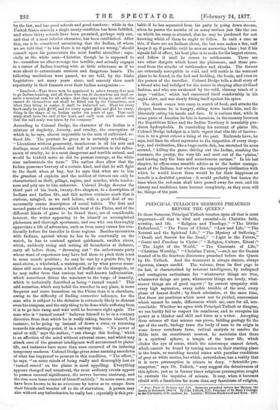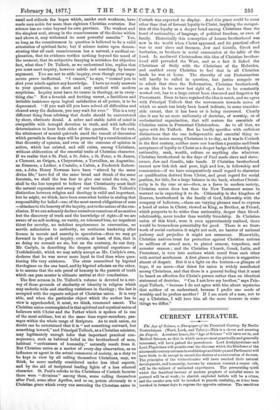PRINCIPAL TULLOCH'S SERMONS PREACHED BEFORE THE QUEEN.* IN these Sermons,
Principal Tulloch touches upon all that is most important—all that is vital and essential—in Christian faith, worship, and life. "Religion and Theology," "The Divine Fatherhood," "The Peace of Christ," "Law and Life," "The Natural and the Spiritual Life," "The Mystery of Suffering," "Death and Sorrow for the Dead," "Light in the Future," "Grace and Freedom in Christ ;" "Religion, Culture, Ritual ;', " The Light of the World," " The Contrasts of Life," "Christian Worship," "Christian Union,"—such are the themes treated of in the fourteen discourses preached before the Queen by Dr. Tulloch. And the treatment is always sincere, always vigorous, always candid. The volume, from its first page to its last, is characterised by reverent intelligence, by unfeigned and contagious enthusiasm for "whatsoever things are true, whatsoever things are pure, whatsoever things are lovely, what- soever things are of good report ;" by earnest sympathy with every high aspiration, every noble trouble of the soul, every phase of honest doubt ; by frank admission, at the same time, that there are positions which must not be yielded, concessions 'which cannot be made, differences which are, once for all, irre- concilable. Whether we agree with Principal Tulloch or disagree, we can hardly fail to respect his manliness, and to recognise his power as a thinker and skill and force as a writer. Accepting from science all that science can prove, bidding geology fix the age of the earth, biology trace the body of man to its origin in some lower vertebrate form, critical analysis to resolve the Bible into its constituent sources, he maintains that there is a spiritual sphere, a temple of the inner life, which eludes the eye of sense, which the microscope cannot detect, which cannot be found by tracing nerves to their starting-place in the brain, or matching mental states with peculiar conditions of grey or white matter, but which, nevertheless, has a reality that it is mere presumption in science to deny. "Scientific pre- sumption," says Dr. Tulloch, "may suggest the delusiveness of this sphere, just as in former times religious presumption sought to restrain the inquiries of science. It may, when it becomes ribald with a fanaticism far worse than any fanaticism of religion,
* Some Facts of Religion and Life. Sermons preached before her Majesty the Queen in Scotland, 1866-76. By John Tulloch, D.C., Principal of St. Mary's College, In the University of St. Andrew, Sc. London: WillitunBlackwood and Sons. 1877.
watail and ridicule the hopes which, amidst such weakness, have made men noble for more than eighteen Christian centuries. But science has no voice beyond its own province. The weakest and the simplest soul, strong in the consciousness of the divine within and above it, may withstand its most powerful assaults." Yes, so long as the consciousness in question is believed to be a valid attestation of spiritual facts; but if science insists upon demon- strating that all such consciousness has a natural, a medical ex- planation, that its evidence verifies nothing beyond the mood of the moment, that its subjective fancying is mistaken for objective fact, what then ? Dr. Tulloch, as we understand him, replies that you must meet inquiry, however subtle and searching, by honest argument. You are not to stifle inquiry, even though your argu- ments prove ineffectual. "I cannot," he says, "counsel you to shut your minds against any knowledge. I have no ready answers to your questions, no short and easy method with modern scepticism. Inquiry must have its course in theology, as in every- thing else." But a feverish and fretting unrest, a fastidious and irritable insistence upon logical satisfaction at all points, is to be deprecated. "If you wait till you have solved all difficulties and cleared away the darkness, you may wait for ever." This is a very different thing from advising that doubt should be encountered by sheer, obstinate denial. A sober and stable habit of mind is compatible with intrepid devotion to truth, and with inflexible determination to hear both sides of the question. For the rest, the attainment of mental quietude amid the tumult of discussion which prevails in these days will be promoted by a consideration of that diversity of opinion, and even of the outcome of opinion in action, which has existed, and still exists, among Christians, without obliteration of the essential traits of Christian character. If we realise that a St. Paul, a St. John, a St. Peter, a St. James, a Clement, an Origen, a Chrysostom, a Tertullian, an Augustine, an Erasmus, a Luther, a Castalio, a Calvin, a Frederick Robert- son, a John Henry Newman have been "stirred by the same divine life," have fed of the same bread and drunk of the same fountain, we shall the less fear to give our mind the rein, we shall be the less tempted to believe that Christianity must limit the natural expansion and sweep of our faculties. Dr. Tulloch's distinction between religion and theology is valid and important, but he might, we think, have been somewhat bolder in stating that responsibility for belief—one of the most sacred obligations of man —attaches to the honesty of the inquiry, not to the nature of the con- clusion. If we can solemnly declare ourselves conscious of no motive but the discovery of truth and the knowledge of right—if we are aware of no self-seeking, no vanity, no tolerated bias, no impatient thirst for novelty, no indolent acquiescence in convention, no servile submission to authority, no mutinous hankering after licence in morals and anarchy in speculation—then we may go forward in the path of inquiry, certain, at least, of this, that in so doing we commit no sin, but on the contrary, do our duty. Mr. Carlyle, in describing the deepest spiritual experience of Teufelsdrockh, which we may safely accept as Mr. Carlyle's own, declares that he was never more loyal to God than when ques- tioning His very existence. The error committed by bigoted theologians on the one hand, and by bigoted atheists on the other, is to assume that the sole proof of honesty in the pursuit of truth which can pass muster is ultimate arrival at their conclusions.
The first sermon in Dr. Tulloch's volume is devoted to a sur- vey of those grounds of similarity or identity in religion which may underlie wide and startling variations in theology; the last is occupied with the cognate subject of Christian union. It is very able, and when the particular object which the author has in view is apprehended, it must, we think, command assent. The Christian union contemplated is that spiritual and mystical union of believers with Christ and the Father which is spoken of in one of the most sublime, but at the same time super-mundane, pas- sages within the whole range of Scripture. As to such union, no doubt can be entertained that it is "not something outward, but something inward," and Principal Tulloch, as a Christian minister, may legitimately enough infer that important practical con- sequences, such as habitual belief in the brotherhood of men, habitual "enthusiasm of humanity," naturally result from it. But Christian union as a matter of every-day observation, as an influence or agent in the actual commerce of society, as a duty to be kept in view by all calling themselves Christians, may, we think, be more usefully considered under less ideal aspects, and by the aid of Scriptural leading lights of a less ethereal character. St. Paul's rebuke to the Christians of Corinth because there were " divisions " among them, some calling themselves after Paul, some after Apollos, and so on, points obviously to a Christian grace which every one assuming the Christian name in
Corinth was expected to display. And this grace could be none other than that of fervent loyalty to Christ, implying the recogni- tion of this loyalty as a deeper bond among Christians than the bond of nationality, of language, of political freedom, or even of family. Historically this conception of human brotherhood was new in the world when Christ appeared, and its practical effect was to seat slave and freeman, Jew and Gentile, Greek and barbarian, as brothers in social communion at the table of the Lord. In mediteval Christendom this idea of Christian brother- hood still pervaded the West, and as a fact it linked the Christians of Sicily with the Christians of the Hebrides, and enabled every Christian to feel that in all Christian lands he was at home. The sincerity of our Protestantism will hardly be called in question, but justice compels us to admit that since the Reformation, Christian brotherhood, as an idea to be never lost sight of, a fact to be constantly worked out, has to a large extent been obscured and forgotten by Protestants. Even to have regained the idea is much, and we agree with Principal Tulloch that the movements towards union of which so much has lately been heard indicate, to some consider- able extent, that it has been or is being recovered. Clearly also it can be no mere uniformity of doctrine, of worship, or of ecclesiastical organisation, that will restore the essentials of Christian union in Protestant Christendom. As to all that, we agree with Dr. Tulloch. But he hardly specifies with sufficient distinctness that the one indispensable and essential thing re- quisite for union among Christians is to-day, as it was in Corinth in the first century, neither more nor less than a genuine and frank acceptance of loyalty to Christ as a deeper badge of fellowship than nationality, rank, wealth, culture or anything else whatever. Christian brotherhood in the days of Paul made slave and slave- owner, Jew and Gentile, take hands. If Christian brotherhood cannot now link rich and poor, high and low, in fellowship and communion—if we have comparatively small regard to character or qualification derived from Christ, and great regard for social position, for title, for a large balance in the bank, whether Christi- anity is in the case or no—then, as a force in modern society, Christian union does less than the New Testament seems to warrant us in expecting it to do. Citizenship in the kingdom of Heaven, brotherhood in the family of God, fellowship with the company of believers,—these are varying phrases used to express a bond of union in Christ, viewed as King, as Brother, as Friend, which purports to be wider than nationality, deeper than blood- relationship, more tender than worldly friendship. In Christian union of this kind, were it even approximately realised, there would be tremendous potentiality for good. There is no frost- work of social exclusion it might not melt, no barrier of national jealousy and prejudice it might not surmount. Meanwhile, Christian nations trust for protection against Christian nations to millions of armed men, to plated armour, torpedoes, and monster cannon ; and the Christian Church, Greek, Latin, and Protestant, is torn into sections which recoil from each other with mutual anathemas. A first glance at the picture is suggestive almost of despair. But it is a light on the horizon—a glimpse of hope, if no more—that thirst for union is widely manifested among Christians, and that there is a general feeling that it must be based on affection for Christ's person rather than on identical statement of doctrine. "Can I not love my brother," says Prin- cipal Tulloch, "because I do not agree with him about mysteries that neither of us understand, because I prefer one mode of worship and he prefers another? If I am much of a man, not to say a Christian, I will love him all the more because in some things we differ."



































 Previous page
Previous page